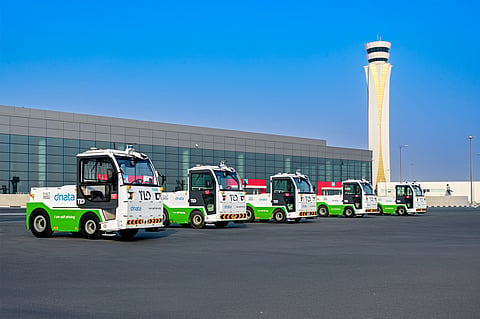Dubai airport trials self-driving baggage tractors – Here is how they work
Six electric vehicles introduced at DWC to boost efficiency and safety

Dubai: Dubai's Al Maktoum International Airport is now using self-driving electric tractors to move baggage. Aviation services company dnata has launched a fleet of six autonomous vehicles at the airport, representing an investment of Dh6 million, it said on Tuesday.
The tractors, which can tow up to four baggage containers at a time, will initially operate with minimal human oversight, with plans to transition to full self-driving capability by early 2026.
dnata said it now operates six electric tractors – the EZTow model, developed by TractEasy – at DWC. dnata stated that the move will enhance efficiency and safety, enabling staff to be reassigned to more complex tasks. The deployment is part of a push towards automation as Dubai World Central expands to become the world's largest airport.
Trials of similar technology are underway in over 15 countries, but dnata claims this launch marks a significant step in bringing autonomous vehicles into regular airport operations.
Traditionally, baggage is transported between the terminal and aircraft by human drivers, each operating under tight time constraints. The new autonomous vehicles streamline this process by towing up to four baggage containers (ULDs) at a time at speeds of up to 15 km/h, following pre-defined routes.
What will it do?
Beyond its day-to-day role, dnata stated that it would utilise this deployment as a testbed to trial and refine various operating models for autonomous ground handling. The aim is to identify the most effective approach for wider rollout, especially as DWC expands into what is set to become the world’s largest airport, with capacity for up to 260 million passengers and 12 million tonnes of cargo annually.
The insights gained will help shape how automation is built into the core of future airport operations at DWC, it said.
“This is an important step forward for both dnata and the wider aviation industry,” said Jaffar Dawood, Divisional Senior Vice President for UAE Airport Operations at dnata.
“While autonomous vehicles have largely been limited to trials, this deployment brings the technology into regular, day-to-day operations. As global travel continues to rebound and operational demands increase, automation could be key to building smarter, safer and more resilient infrastructure,” he said.
Autonomous ground support equipment (GSE) has become a key focus area for innovation in recent years. According to the IATA, such trials are currently underway in more than 15 countries, although most remain in early testing phases or are restricted to small-scale pilots.
“Autonomous GSE adoption is taking off,” said Rich Reno, TractEasy’s CEO.
Sign up for the Daily Briefing
Get the latest news and updates straight to your inbox


